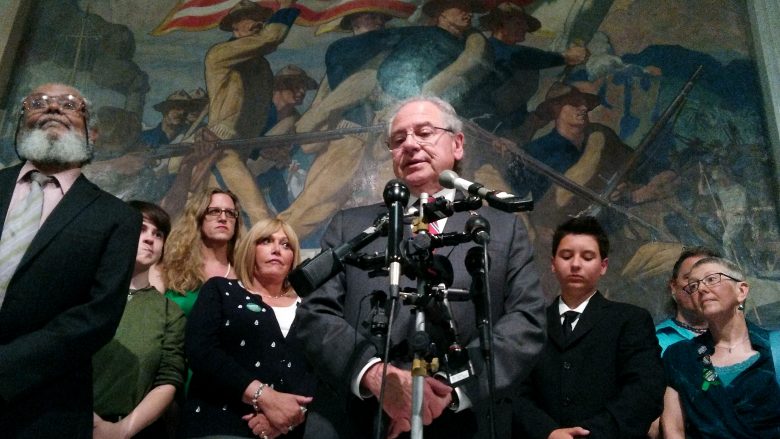‘Bathroom bill’ passes Massachusetts House as foes fail
By Evan Lips | June 1, 2016, 21:33 EDT
 State Rep. Byron Rushing (D-Boston), left, listens as House Speaker Robert DeLeo (D-Winthrop) speaks to reporters about passage of the ‘bathroom bill’ Wednesday in the State House. (New Boston Post photo by Evan Lips)
State Rep. Byron Rushing (D-Boston), left, listens as House Speaker Robert DeLeo (D-Winthrop) speaks to reporters about passage of the ‘bathroom bill’ Wednesday in the State House. (New Boston Post photo by Evan Lips) BOSTON — After a virtual marathon of proposed amendments, moral platitudes and the occasional outburst from the gallery by supporters and opponents alike, the state House of Representatives overwhelmingly passed a bill that would ensure access to the public bathroom or changing room of choice for transgender people.
Wednesday’s pivotal 116-36 largely party-line vote saw a crush of activists fill the State House’s corridors and atriums as action on this particular issue drew the biggest crowds of the current session to demonstrate and lobby lawmakers. Meanwhile, inside the chamber, a series of Republican-sponsored amendments aimed at adding privacy restrictions and enforcement measures onto the so-called “bathroom bill” died one after another.
The debate and vote took place against a backdrop of national attention to the issue that has drawn in President Barack Obama and led to dueling lawsuits in North Carolina that pit Obama’s Justice Department against Republican Gov. Pat McCrory. Meanwhile, a federal Education Department directive to all public schools in the U.S. ordering transgender access to bathrooms and locker rooms of choice spawned legal challenges last month from at least a dozen states, led by Texas.
In Boston, the state Senate last month passed a bathroom bill that differs significantly from the version voted through the House on Wednesday. But whether a compromise measure will need to be worked out remains to be seen, as Democratic legislative leaders eye the possibility of a veto by Republican Gov. Charlie Baker.
Looking past the transgender access issue, Democratic lawmakers suggested there may be more to come.
Moments ahead of the crucial final vote, state Rep. Byron Rushing (D-Boston), one of the bill’s sponsors, called the opportunity to tackle the issue “an incredible privilege” but also stressed that there are other causes lying in wait.
“Let me remind you that there will be others to come,” he noted at one point during his remarks.
Asked following the vote to elaborate on the comment, Rushing said he was referring to the overall need to pay closer attention to various causes.
“We can’t assume that we are finished,” he said. “Certainly my colleagues — that’s who I was speaking to — it’s important that we stay connected to average people in Massachusetts, listen to them, and sense if there are inequities in their life that have nothing to do with the content of their character.”
For the bill’s opponents, Wednesday’s defeat stung. Andrew Beckwith, president of the conservative Massachusetts Family Institute, took issue in particular with Rushing’s comments and wondered aloud what the Boston state representative truly meant when he alluded to future causes.
The opposition leader also said he was disappointed that lawmakers failed to consider any of the “protections or safeguards for women and children” offered in various amendments.
Beckwith did add however that he was impressed by the 300-plus people that flooded the capitol’s halls and galleries Wednesday to voice their opposition to the bill.
Kris Mineau, former president and current chairman of the institute’s board, said he “fears for the privacy, safety and modesty” of women who may be averse to transgender women with male anatomy entering private spaces like bathrooms, locker rooms and showers.
Asked if he would have changed any part of the strategy to oppose the measure, Mineau said they shouldn’t have focused so much on bathrooms.
“I think we should have called it the ‘girls’ shower room bill,’” Mineau said. “Because what I’m finding now is when you ask people if they want their daughter or granddaughter showering with a male exposing his genitalia, the answer is no — that is the bottom line.”
Mineau noted that the group had fought versions of the legislation “successfully for eight years.”
“That’s four different sessions that we defeated this thing in committee, because we always knew the votes were there,” he added. “Today is a painful hit.”
Those previous battles, however, lacked the backdrop of a national debate on the issue and one where supporters succeeded in framing such bills as antidiscrimination measures. The Obama administration’s directive is based on a 1972 law that bars discrimination in education programs based on sex.
The polarizing nature of the bill was apparent throughout the day, as supporters clashed with opponents, especially immediately following the historic vote. Waving signs denouncing the legislation, opponents chanted “shame on you” at House members as they left the chamber and sparred verbally with the bill’s supporters.
Yet there was at least one conservative onlooker who celebrated the bill’s passage: Charlton resident Jordan Evans, a transgender woman and registered Republican. Evans, who sat through all six-plus hours of the debate, said opposition is rooted in misunderstanding.
“There is still a lot of fear and unless you actually tackle that fear, no matter how well you explain it to them in a logical sense, it will prevail,” Evans said.
Asked about the Republican opposition’s strategy, Evans didn’t mince words.
“It’s going to take a policy of understanding and coming together from the party for it to change from within,” Evans said. “I feel like now that this has happened, and now that it is going to get signed, once they see that nothing bad is going to come out of it they are going to realize that it was just misguided fear.”
On Tuesday, Baker shifted the political ground for the debate by coming off the fence on the issue and saying he would sign the House version, which differs from the Senate’s bill by including language calling on Attorney General Maura Healey to draft rules regarding people who try to abuse its provisions for nefarious purposes. The Senate bill doesn’t deal with enforcement.
Following the vote, House Speaker Robert DeLeo (D-Winthrop) said he would be disappointed if the bill winds up being changed in a conference committee debate between the upper and lower chambers.
“It is my hope — it would be my wish — that we are able to avoid a conference committee,” DeLeo told reporters. “I believe the governor made it clear that he would sign the House bill.”
“But I come here as Speaker to have real victories, and most importantly I want to see this become law and hopefully the sooner the better — I’m the type that won’t rest until it’s actually signed,” the Speaker told reporters.
DeLeo added that he didn’t know of Baker’s intentions to sign the House version until the governor made public his shift in stance Tuesday. He added that the governor’s sudden support “obviously” helped clear the way for some hesitant lawmakers to back the bill, leading to the overwhelmingly favorable vote.
Bill opponents like Beckwith, however, remain concerned that the House version relies on Healey, a vocal supporter of the legislation, to draft enforcement measures.
“It’s a complete cop-out to punt the most meaningful aspects of the bill to the attorney general,” he said. “It’s just outrageous.”
Beckwith said he hopes the turnout of bill opponents will cause Baker to reconsider his support, although Wednesday’s margin suggests the House version is veto-proof. He said bill opponents ventured to Baker’s office to show their displeasure, although the governor wasn’t in the building at the time.
“We directed opponents to call the governor’s Boston office and we later found out his voicemail was shut down within minutes,” Beckwith added. “There’s a groundswell here of real concern on this issue.”
“People are not happy and I’m hoping the governor will rethink this one,” Beckwith said.











